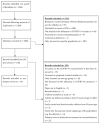Causes of Vaccine Hesitancy in Adults for the Influenza and COVID-19 Vaccines: A Systematic Literature Review
- PMID: 36146596
- PMCID: PMC9503596
- DOI: 10.3390/vaccines10091518
Causes of Vaccine Hesitancy in Adults for the Influenza and COVID-19 Vaccines: A Systematic Literature Review
Abstract
Background: Vaccine hesitancy was labelled as one of the top ten threats to global health by the World Health Organization in 2019 and is associated with negative health outcomes. Previous reviews on cause of vaccines have not included vaccine hesitancy related to the COVID-19 vaccine. This review aimed to fill this gap by synthesising the findings of studies identifying causes of vaccine hesitancy to the COVID-19 and influenza vaccines.
Methods: A systematic literature review was conducted. Searches were carried out in the PubMed, EMBASE and Cochrane databases. Following data extraction, a thematic analysis was conducted of the causes of vaccine hesitancy in adults for the influenza and COVID-19 vaccines.
Results: Fourteen papers were included. Four themes were identified as causes of vaccine hesitancy comprising: concerns over safety, lack of trust, lack of need for vaccination and cultural reasons. While concerns over safety were found in all countries, some of these were specific to particular countries and cultures. Our findings suggest that scientific knowledge of vaccines and size of clinical trials during their development reduce vaccine hesitancy. However, pharmaceutical companies were not a trusted source of information.
Conclusion: Our findings build on those of previous research to suggest specific information that may be helpful in addressing vaccine hesitancy. Targeted approaches from trusted sources are needed to address specific safety concerns.
Keywords: COVID-19; adults; influenza; vaccine hesitancy.
Conflict of interest statement
The authors declare no conflict of interest.
Figures
References
-
- Ten Threats to Global Health in 2019. [(accessed on 29 July 2022)]. Available online: https://www.who.int/news-room/spotlight/ten-threats-to-global-health-in-....
-
- Vaccine Effectiveness: How Well Do Flu Vaccines Work? [(accessed on 26 June 2022)]; Available online: https://www.cdc.gov/flu/vaccines-work/vaccineeffect.htm#:~:text=Flu%20va....
Publication types
LinkOut - more resources
Full Text Sources


